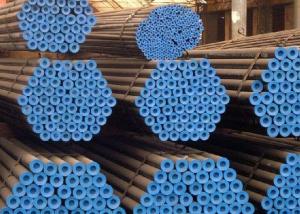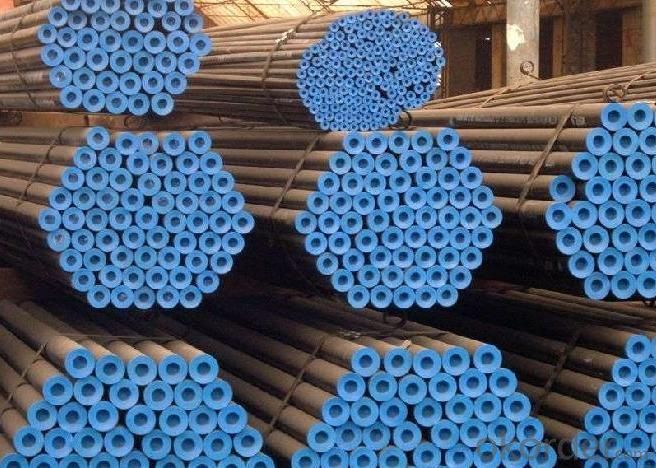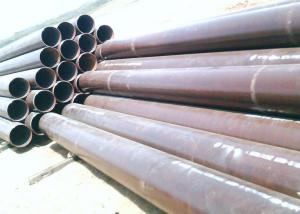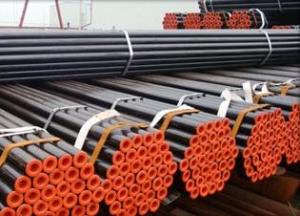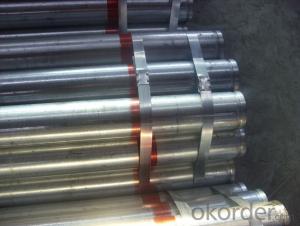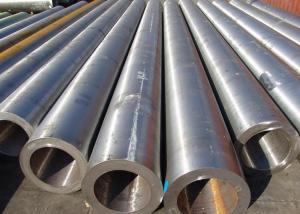Tube For Hydraulic Pillar Service Grade 35# Seamless Steel Pipe
- Loading Port:
- China Main Port
- Payment Terms:
- TT or LC
- Min Order Qty:
- Negotiable m.t.
- Supply Capability:
- 5000 Tons Per Month m.t./month
OKorder Service Pledge
OKorder Financial Service
You Might Also Like
Seamless Steel pipes
Standard of Tube For Hydraulic Pillar Service Grade 35# Seamless Steel Pipe
API SPEC 5L, API SPEC 5CT, ASTM A53, GB/T9711.1
Description of Tube For Hydraulic Pillar Service Grade 35# Seamless Steel Pipe
Product name | ASTM A106 Gr.B /API 5LGr.B Seamless steel pipe |
Outside Diameter | 10.3-1020mm |
Wall Thickness | 4-90mm |
Standard | DIN ASTM API GB |
Material | 10# 20# 45# Q235 Q195 Q345 |
Origin | China |
Certificate | API5L ISO9000 API 5CT |
Technique | hot rolled |
application | use for oil well, boilers, precision machines, petro-chemical, ship, structure pipe, building, fluid tubes, line pipe etc |
Testing | we have professional testing equipments such as ultrasonic testing machine, eddy current testing machine, mechanics testing machine to make sure high quality |
Tolerance: | WT TOLERANCE-5%+5% |
Min Order | 5 TON |
Usage | Petroleum and natural gas industry, chemical industry, electric industry, flammable and non-flammable liquid transportation and steel construction, drainage project and city construction etc. |
Package | in bulk , in bundle, standard seaworthy package |
Length | 1-12M |
Delivery time | 15-20 days after received the advanced payment |
Packing | Black paint or varnish ,plastic caps with the both ends |
CHEMICAL COMPOSITION (%)
C (Max) | Mn(Max) | Si(Max) | S(Max) | P(Max) |
0.22 | 1.6 | 0.5 | 0.035 | 0.035 |
MECHANICAL PROPERTIES
Elongation(Min) | Y.S (Min.) | UTS (Min.) |
≥15 | 470 N/MM2 | 580 N/MM2 |
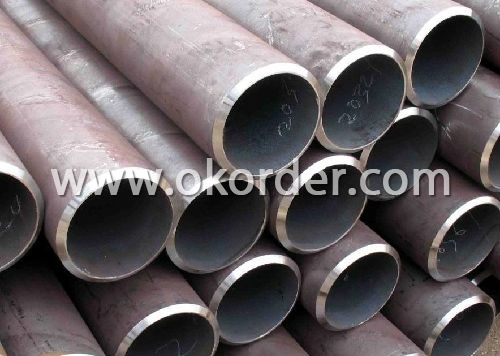
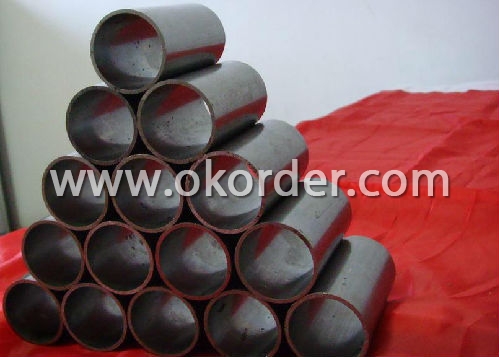
- Q: What are the advantages of using steel pipes over other materials?
- There are several advantages of using steel pipes over other materials. Firstly, steel pipes are incredibly durable and have a high tensile strength, making them resistant to extreme temperatures, pressure, and corrosion. Secondly, steel pipes have excellent structural integrity, allowing for longer spans and fewer supports. Additionally, steel pipes are highly versatile and can be easily welded, threaded, or joined, making installation and maintenance easier. Lastly, steel pipes are cost-effective in the long run as they require minimal maintenance and have a longer lifespan compared to other materials.
- Q: What are the different shapes available for steel pipes?
- There are several different shapes available for steel pipes, including round, square, rectangular, and oval shapes.
- Q: How do steel pipes handle thermal expansion and contraction?
- Steel pipes handle thermal expansion and contraction by allowing for slight movement and flexibility. When heated, the steel pipe expands, and when cooled, it contracts. To accommodate these changes, expansion joints or loops are often incorporated into the pipe system. These joints or loops allow the pipe to expand and contract without causing stress or damage. Additionally, proper insulation and support are essential to minimize the effects of thermal expansion and contraction on steel pipes.
- Q: Can steel pipes be used for transporting drinking water?
- Yes, steel pipes can be used for transporting drinking water. However, it is important to ensure that the steel pipes are properly coated and protected to prevent any corrosion or leaching that could contaminate the water. Additionally, regular maintenance and monitoring of water quality should be conducted to ensure the safety of the drinking water.
- Q: What is the outer diameter of the steel tube?
- The diameter of a steel pipe refers to the diameter of the steel pipe. The specifications of the steel tube is normal with diameter (diameter and thickness) said, for example 100MM outer diameter and wall thickness of 5MM tube is marked with 100*5.
- Q: What is the purpose of galvanizing steel pipes?
- The purpose of galvanizing steel pipes is to protect them from corrosion and increase their lifespan.
- Q: How do steel pipes handle expansion and contraction?
- Steel pipes handle expansion and contraction through their inherent elasticity and ability to withstand high temperatures. When exposed to heat, steel pipes expand due to thermal expansion, and when cooled, they contract due to thermal contraction. This expansion and contraction are accommodated by the flexibility of the steel material, allowing it to withstand the changes in size without significant damage or deformation. Additionally, proper installation techniques such as the use of expansion joints and loops can also help accommodate the expansion and contraction of steel pipes, ensuring their integrity and longevity.
- Q: How are steel pipes used in the marine industry?
- Steel pipes are commonly used in the marine industry for various applications such as shipbuilding, offshore oil and gas exploration, and marine infrastructure. They are utilized for constructing hulls, pipelines, and support structures due to their high strength, durability, and resistance to corrosion from seawater. Steel pipes also provide a reliable and efficient means of transporting fluids, gases, and other materials within marine vessels and structures.
- Q: What is the role of steel pipes in the chemical manufacturing industry?
- Steel pipes are an essential component in the chemical manufacturing industry as they are used for various purposes such as transporting chemicals, gases, and liquids safely and efficiently. They provide a durable and corrosion-resistant infrastructure, ensuring the integrity of the chemical processes. Steel pipes also play a crucial role in maintaining the overall safety and reliability of the manufacturing operations.
- Q: What are the different methods of protecting steel pipes from corrosion?
- There are several methods of protecting steel pipes from corrosion, including coating the pipes with materials such as epoxy, polyethylene, or zinc; applying cathodic protection by using sacrificial anodes or impressed current; and employing corrosion inhibitors to prevent the formation of rust. Regular maintenance and inspections are also crucial in identifying and addressing any potential corrosion issues.
1. Manufacturer Overview
| Location | Henan, China |
| Year Established | 2001 |
| Annual Output Value | 800,000Tons |
| Main Markets | Europe and the United States; Canada; India; South etc. |
| Company Certifications | API 5L; API 5CT; GB/T19001-2000 idt ISO9001:2000 |
2. Manufacturer Certificates
| a) Certification Name | |
| Range | |
| Reference | |
| Validity Period |
3. Manufacturer Capability
| a) Trade Capacity | |
| Nearest Port | Qingdao; Lianyungang |
| Export Percentage | 50% - 60% |
| No.of Employees in Trade Department | 1000-1100 People |
| Language Spoken: | English; Chinese; Spanish |
| b) Factory Information | |
| Factory Size: | Above 423,000 square meters |
| No. of Production Lines | Above 10 |
| Contract Manufacturing | OEM Service Offered; Design Service Offered |
| Product Price Range | Average |
Send your message to us
Tube For Hydraulic Pillar Service Grade 35# Seamless Steel Pipe
- Loading Port:
- China Main Port
- Payment Terms:
- TT or LC
- Min Order Qty:
- Negotiable m.t.
- Supply Capability:
- 5000 Tons Per Month m.t./month
OKorder Service Pledge
OKorder Financial Service
Similar products
Hot products
Hot Searches
Related keywords
